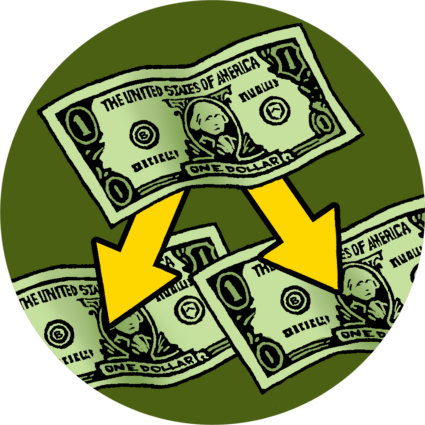Farmers Market SNAP Incentive Programs

- What is a SNAP incentive program?
- Will participating in a SNAP incentive program create legal responsibilities for my market?
-
What is a SNAP incentive program?
SNAP incentive programs are initiatives that encourage SNAP customers to spend their benefits at farmers markets by providing a financial incentive for doing so. These programs may be publicly funded by a federal, state, or local government agency or privately funded by a foundation, nonprofit organization, individual, or the market organization itself.
For example, some “matching” programs provide SNAP customers with one dollar (toward a SNAP-eligible purchase) for every dollar of SNAP benefits spent at the market, up to a certain dollar amount, effectively doubling the SNAP customer’s buying power. Other versions of cash incentives for SNAP purchases are used as well.
Back to questions
-
Will participating in a SNAP incentive program create legal responsibilities for my market?
Generally, if the market is receiving funding for the incentive program from another organization, the market must sign an agreement with the incentive provider that sets forth program requirements and obligations.
For example, Colorado and Washington received SNAP Electronic Healthy Incentives Project (eHIP) grants from FNS to operate SNAP Produce Rewards programs that provide extra benefits to people who buy fruits and vegetables with their SNAP dollars, including from participating farmers market vendors. FNS requires participating vendors to be individually SNAP authorized and have their own POS equipment to process EBT cards, rather than relying on a market-operated currency system.
Note: Some markets run their own incentive programs for which they raise funds through donations and other means; in this case, markets would not have any agreement with an incentive provider.
Example: NOFA-VT’s 2017 “Crop Cash Incentive Program”
Funded in part through a USDA Federal Food Insecurity Nutrition Incentive (FINI) grant received by Wholesome Wave, the Northeast Organic Farming Association of Vermont (NOFA-VT) administers the statewide Crop Cash Incentive Program (CCIP). CCIP is an incentive program for SNAP customers that promotes the purchase of fresh fruits, vegetables, and herbs at farmers markets. To learn more about how the program works, click here.
To participate in CCIP, a farmers market must sign a two page agreement with NOFA-VT that sets forth:
- General program operations;
- Requirements for participating in Crop Cash with NOFA-VT;
- Rules regarding how markets can issue Crop Cash to customers;
- Reimbursement requirements;
- Data collection and reporting requirements (including penalties for failing to submit timely data);
- Vendor eligibility and expectations;
- Required training; and
- Mediation.
To review an example CCIP agreement, click here.
Further, Wholesome Wave requires that its FINI grant subrecipients (in this example, NOFA-VT) secure commitments from participating market leaders that, in accordance with FINI grant requirements, FINI funds for nutrition incentives will only be used to incentivize fruits, vegetables, and herbs. To that end, Wholesome Wave provides grant subrecipients with a “Market Contact Pledge” to distribute to, have signed by, and then collect from each participating market. The grant subrecipients then must submit all the pledges back to Wholesome Wave.
The “Market Contact Pledge” states, among other things: “I have spoken directly with every vendor who sells at my market and clearly explained the parameters of the FINI funding: Vendors that sell fruits and vegetables understand that they can accept incentive dollars funded through FINI. Vendors that sell other products (not fruits and vegetables) understand that they cannot accept incentive dollars funded through FINI.”
To review Wholesome Wave’s “Market Contact Pledge,” click here.
Back to questions
